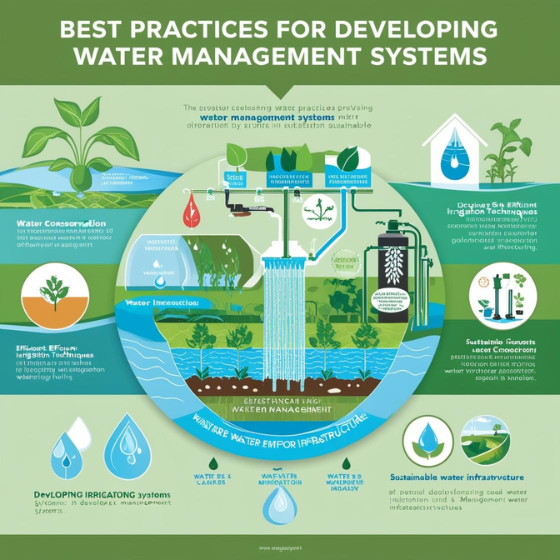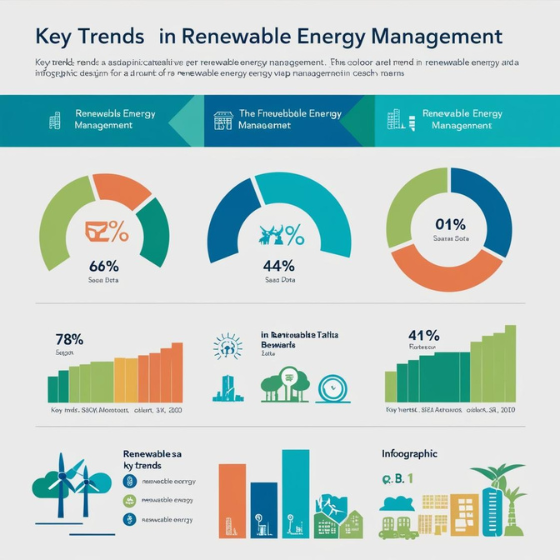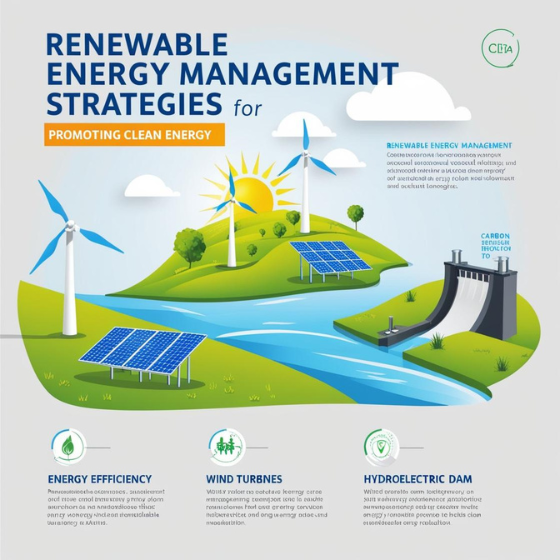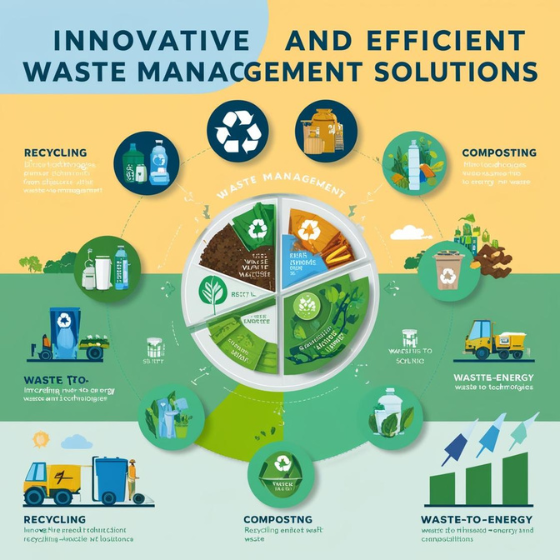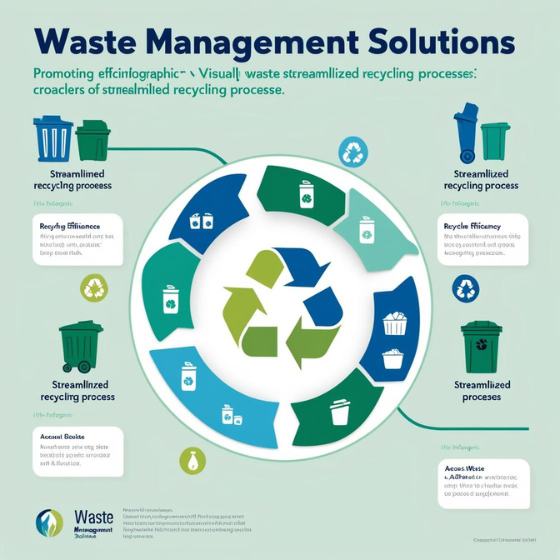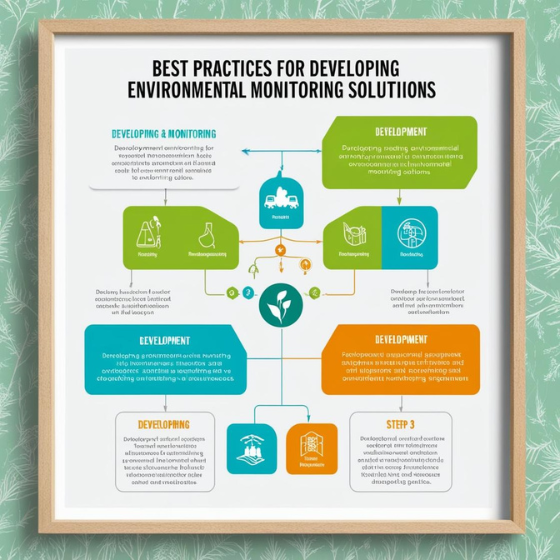Best Practices for Developing Water Management Systems
Efficient water management is essential for ensuring sustainable water use, especially in a world facing increasing water scarcity. The need for effective water management systems is becoming more urgent as we experience climate change, population growth, and increased industrial demand. These systems are not only vital for conservation but also for improving operational efficiency and ensuring equitable distribution. In this blog, we will outline the best practices for developing effective water management systems that can help businesses, municipalities, and agricultural sectors optimize water use, reduce waste, and enhance sustainability.
1. Understand Local Water Availability and Demand
Before developing any water management system, it is crucial to fully understand the local context, including the availability of water resources and the demand for water in your area. A thorough understanding of these factors is vital for creating a system that can effectively address local needs.
Steps for Assessing Water Availability and Demand:
- Conduct Water Audits: Assess how much water is being used and identify areas of potential waste.
- Analyze Seasonal Variations: Understand how water availability fluctuates throughout the year to plan accordingly.
- Consult Local Authorities: Collaborate with local government agencies and environmental experts to understand regional water supply and regulations.
By understanding the local availability and demand for water, you can ensure that your water management system is tailored to the needs of the region and can handle seasonal or environmental changes.
2. Incorporate Advanced Technology for Monitoring and Control
Advancements in technology play a crucial role in modern water management. By using advanced sensors, smart meters, and data analytics, you can gain real-time insights into water usage, quality, and system performance. These technologies not only enhance the efficiency of water use but also enable timely detection of leaks and other issues that could result in water loss.
Key Technologies for Efficient Water Management:
- Smart Water Meters: These devices track water usage in real-time, providing valuable data that helps in detecting leaks and optimizing water distribution.
- Remote Monitoring Systems: Sensors placed in various parts of the water infrastructure (e.g., pumps, pipes, reservoirs) can monitor parameters like pressure, flow rates, and water quality.
- Data Analytics: AI and machine learning can be used to predict water demand patterns, detect inefficiencies, and forecast future needs, making water management more proactive.
Incorporating these technologies not only helps you stay on top of water usage but also allows for faster responses to potential issues, minimizing water wastage and system downtime.
3. Promote Water Conservation Through Education and Incentives
A successful water management system goes beyond infrastructure and technology—it also requires behavioral change. Encouraging water conservation practices in both residential and commercial sectors can significantly reduce overall water demand.
Ways to Promote Water Conservation:
- Public Awareness Campaigns: Educate the community about the importance of water conservation and the ways they can reduce water usage in their daily lives.
- Incentivize Water-Saving Technologies: Offer incentives for the installation of water-efficient appliances, such as low-flow faucets, toilets, and smart irrigation systems.
- Behavioral Programs: Partner with local schools, businesses, and communities to develop water-saving programs that encourage responsible water use.
By educating people about the value of water and offering incentives for conservation, you can foster a culture of sustainability that complements your water management system.
4. Integrate Water Recycling and Reuse Systems
Water recycling and reuse are essential practices for any comprehensive water management strategy. By recycling water, especially in industries or large-scale agricultural operations, you can reduce dependence on freshwater sources and lower water treatment costs.
Key Approaches for Water Recycling:
- Greywater Recycling: This involves reusing water from household activities like bathing or washing dishes for purposes such as landscape irrigation or flushing toilets.
- Rainwater Harvesting: Collecting and storing rainwater is an excellent way to supplement water sources for non-potable uses, such as irrigation or industrial processes.
- Industrial Water Treatment: Many industries can treat and recycle wastewater for use in their operations, reducing the need for fresh water.
Incorporating water recycling and reuse practices into your system can significantly reduce overall water consumption and ensure that valuable resources are not wasted.
5. Use Water-Efficient Infrastructure
Investing in water-efficient infrastructure is a key practice for reducing water loss and improving overall system efficiency. This includes everything from pipes and pumps to water storage tanks. Proper maintenance and upgrading of infrastructure can have a huge impact on water conservation.
Key Strategies for Water-Efficient Infrastructure:
- Leak Detection Systems: Use advanced technologies like pressure sensors and flow meters to detect leaks in the water distribution system.
- Repair and Upgrade Old Infrastructure: Aging infrastructure can result in significant water loss. Regularly inspect and repair old pipes, valves, and reservoirs to maintain system integrity.
- Use of Low-Flow Systems: Install low-flow pipes, faucets, and other fixtures to minimize water waste in both commercial and residential settings.
Upgrading infrastructure to more water-efficient systems can dramatically reduce water loss and improve the performance of your overall water management system.
6. Ensure Regulatory Compliance and Sustainability
A water management system should also comply with local and international regulations regarding water use and conservation. It is essential to stay informed about changing regulations and standards to avoid fines and ensure that the system operates within legal limits.
Regulatory Considerations:
- Water Use Permits: Ensure that your water management system complies with local water rights regulations and permit requirements.
- Environmental Impact Assessments: Regularly assess the environmental impact of water management activities to ensure sustainability and minimize negative effects on surrounding ecosystems.
- Sustainable Practices: Align your water management system with sustainable practices, such as conserving local water resources and reducing the carbon footprint of water supply systems.
By adhering to regulations and maintaining a focus on sustainability, you can build a water management system that benefits both your business and the environment.
7. Collaborate with Stakeholders and Experts
Developing an effective water management system requires collaboration with various stakeholders, including local governments, environmental agencies, and industry experts. Working together ensures that the system meets all legal, social, and environmental requirements while maximizing efficiency.
Stakeholder Collaboration:
- Work with Local Authorities: Governments play a key role in regulating water use, enforcing policies, and ensuring equitable distribution. Regular communication with local authorities can ensure compliance with regulations and help optimize resource allocation.
- Consult with Water Experts: Collaborating with engineers and experts in water conservation, technology, and infrastructure can help you design a system that is both efficient and cost-effective.
- Engage the Community: Involve local communities in the development and implementation of water management systems to ensure their needs and concerns are addressed.
Collaboration helps ensure that your water management system is comprehensive, effective, and well-supported by all parties involved.
Conclusion
Developing an effective water management system requires a comprehensive approach that incorporates advanced technology, infrastructure upgrades, education, and collaboration. By following these best practices, you can create a sustainable water management strategy that not only ensures efficient water use but also helps protect this vital resource for future generations. Whether you’re in agriculture, industry, or urban planning, implementing these practices will optimize water use, reduce waste, and promote long-term sustainability.
At Sodio, we specialize in helping businesses and municipalities develop and implement effective water management systems. Our innovative solutions can help you optimize water use, reduce costs, and meet sustainability goals.
Contact Sodio to learn more about our water management solutions and how we can help your business become more water-efficient and sustainable.
